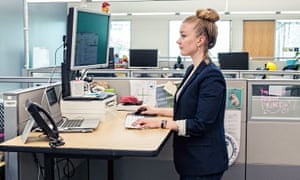
Lunchtime yoga classes, providing help to remove ingrowing toenails and holding meetings while walking around the office – these are just some of the strategies that employers should use to boost staff fitness, according to the NHS public health chief.
Duncan Selbie, chief executive of Public Health England, is also backing workplace running clubs, standing desks to improve posture and staff uniting to try to quit smoking as useful ways businesses can improve employee wellbeing.
In an interview with the Observer, Selbie made clear that Britain’s 5.5 million small and medium-sized enterprises (SMEs) could do much more to tackle the £29bn annual bill for sickness absence while improving productivity and increasing profits at the same time.
“SMEs are the backbone of the nation’s workforce and can kickstart a revolution in helping their staff to improve their health. People spend 30, 40 or sometimes 50 hours a week at work. That’s a unique opportunity for employers to use that big chunk of someone’s week to care for their health,” said Selbie. His plea is aimed at the 5.5 million firms which make up 99% of all private sector businesses and employ 60% of those who work in the private sector.
“Forward-thinking companies are already offering help such as podiatry services to employees who are on their feet all day or group posture exercises for people who stand in the same position for a long time because of their job.
“Employers could adopt group exercise challenges, such as ‘Couch to 5k’ or lunchtime run clubs, and promote active travel like cycling to work. Being regularly active is one of the best ways to prevent and manage poor musculoskeletal health and combat stress, which are both major causes of sickness absence,” he added.
Employers should take a “bottom-up” approach to improving staff health and wellbeing by putting in place ideas that employees want, rather than things that would be “nice to have”, he said.
“We want to see every business take a custom-made approach to employee health by looking at what staff need. We encourage employers to create dynamic environments, workplaces where people can be more active, move more and change positions, with things like standing desks.”
Firms could encourage staff to hold “walking meetings” in the local park rather than sitting down in an office and always eat lunch somewhere other than their desk, Selbie said. Ergonomic assessments of posture could help identify stiffness and pain that may indicate that back problems are emerging which can then be tackled early.
He wants action to encourage more staff to cycle to work. HR Magazine recently found that 33% of employers believe that cyclists are more productive at work than non-cycling colleagues. In addition, 44% of bosses polled said cyclists were more productive
Firms could also use camaraderie between staff to help smokers quit. Selbie suggested using group workplace challenges, such as smokers all signing up to take part in Stoptober together, and that employers could alert workers when mobile bus clinics were due to be in the area.
The PHE boss wants businesses to help staff with their mental health too. “The main way to reduce stress levels is through training line managers in mental health and educating workforces to increase their mental health literacy, and to recognise the signs which indicate that they need support,” he said.
Mike Cherry, national chairman of the Federation of Small Businesses, said that small firms did not have the advantage of large corporations in being able to use their employees to get discount deals for gym memberships or private health providers, for example.
“The average small employer has around seven employees and their approach is often more akin to a family unit than it is a large business. So while many small businesses are not sedentary or desk-based in their work, we know that many are encouraging fitness breaks for running or gym classes, while others have indeed innovated through things such as walking meetings.
“The key is not to instruct or compel them, but for the small business owner and their team to come up with ideas that work for them.”
Selbie added: “Everyone benefits from a healthier workforce: employees, who will enjoy better health and be less likely to be off sick; employers, who will reap the benefits of increased productivity; and the NHS, which will have less poor health to deal with.”
and 89% thought that those who used two wheels had more energy during the day. Research by the National Institute for Health and Care Excellence has found that physically active staff take 27% fewer sick days.
[Source:-theguardian]